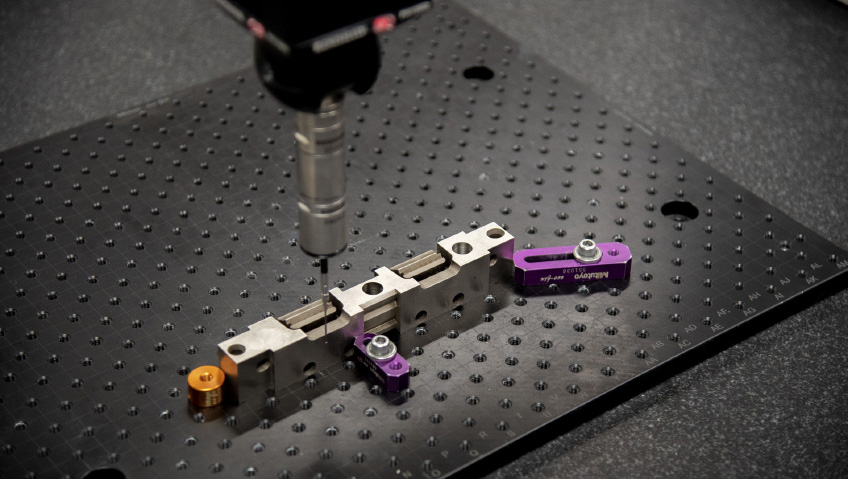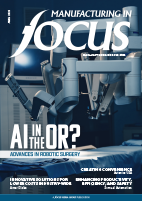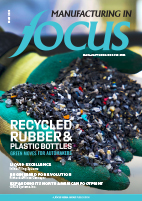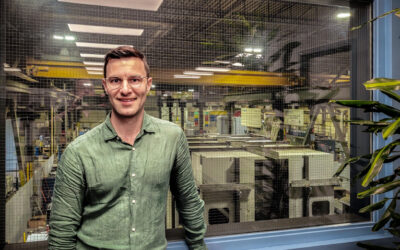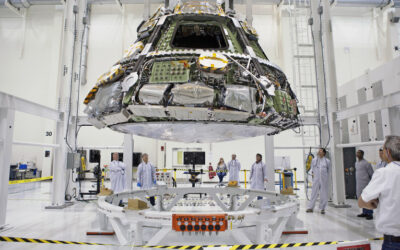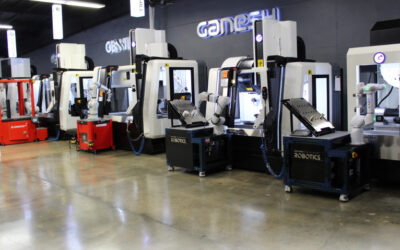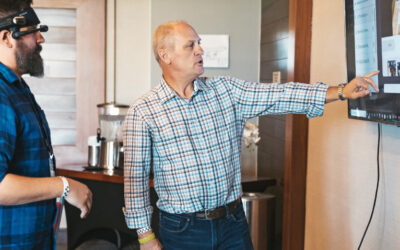Companies like General Motors and General Electric stopped on a dime to create parts that they had never created before for the war effort in the 1940s. Molded Precision Components’ (MPC) reaction to the pandemic earlier this year involved a similar change to help the world’s frontline workers.
The Oro-Medonte, Ontario auto parts company did some major re-tooling back in March and April to start creating much-needed medical supplies for worldwide delivery using its own workforce and equipment.
MPC President and Co-owner David Yeaman says the company recognized the historic importance at the time and sent a camera crew to work, filming a documentary of the whole process; it even made national news. Now the whole country was hearing about how this company that had been making auto parts in central Ontario suddenly invented, received patents and funding for, and mass-produced face shields for frontline workers around the globe.
Yeaman is proud of what the 14-year-old company has accomplished. Until the pandemic took hold in Canada, MPC produced complex plastic parts and assemblies for automobiles. It all came grinding to a halt on St. Patrick’s Day this year with the announcement, by the federal government, of a state of emergency. Canadian Prime Minister Justin Trudeau asked Canadian manufacturers to retool to make personal protective equipment (PPE). Yeaman and his team had a choice.
China had shut down earlier. That meant six to eight weeks of inventory on container ships, plus a couple of weeks at the manufacturers where the parts were going. MPC was already scrambling, trying to figure out how long it could last if the automotive industry went to zero in terms of cash reserves and how long the MPC team could hold on.
“Our choice was to shut down or figure out what to do,” Yeaman says. “When [the federal government] put out that announcement, there was a list of what the needs were, and I contacted our current medical customer and said that Canada is calling for help in making medical components. We’re mostly automotive; there could be some medical collaborations that we could look at to fulfill those needs.”
Yeaman says he and the rest of the management team needed to find a way to redeploy resources. After all, in a pandemic, the last thing anyone wants is to buy a new vehicle. MPC is a vertically-integrated facility in that it has its own in-house design team, tooling manufacturing, automation and injection molding services, and there were already reported shortages of PPE.
Fortunately, MPC already had signed its first medical contract three months prior. Now it was time to take it further.
Not being dependent on other companies, within a week, MPC was able to create its own designs for face shields, collaborating with front line workers to create the first completely Canadian-made face shield that is fully recyclable. The team then made a pitch to the government for a grant to tool it up. It took eight days from an idea to patent to an approval for a grant. Yeaman was shocked.
“It was the fastest I’ve ever seen. Something like that would ordinarily take a year,” he shares. “Not only that, look how the federal government moved; they put an applications process in place for me to actually do, I wrote that up over the weekend, did the pitch by Monday and got approval by Tuesday. That’s usually a six-month process at least.”
MPC did this while still creating auto parts, because, as Yeaman says, that industry will come back, and the company did not want to be caught without inventory. Most companies had to lay off their workers, but with all this new activity, MPC actually had to bring in additional staff, going from 55 workers to 185 to help cope with the demand. It also had to expand, moving an entire warehouse into a local hockey arena and an unused fire hall. An existing warehouse was converted to create an automated face shield manufacturing facility.
“We installed eight, fully-automated injection moulding machines with robots and automated packaging,” Yeaman recalls. “That whole facility had no electrical, no cooling, ethernet, nothing. It was just four walls. So in sixty days, we developed an entire facility capable of making over 170,000 face shields per day in that facility alone.”
MPC was even able to spread the work around. Tool shops had to be utilized around Ontario for this extra activity, because no matter how big a company gets, it cannot do everything. Honda Canada in nearby Alliston, Ontario, contacted Yeaman after hearing what his company was doing and started helping with finding enough tool shops and installing equipment and electrical systems. Transportation company Ryder stepped up, providing trucks and drivers. Within the surrounding township, a local restaurant helped by providing meals through the process.
“So, it kept their doors open too,” says Yeaman. “It proliferated throughout the whole community, and it was great to be a part of.”
It is about turning a bad year into a good one, and it is already paying off. Just recently, MPS was honoured to receive a Responding to COVID – Industry Leadership Award in the PPE Medium Sized Company Category, one of eight recognitions made by Canadian Manufacturing Magazine and their sister publications at a virtual gala keynoted by NGen and opened by Federal Minister for Innovation, Science and Industry, the Rt Honourable Navdeep Bains.
MPC has also been approached by other companies, including medical supply companies around the world. It is getting into manufacturing other products for the medical industry, including N95 masks, hand sanitizer, test kits, gowns, and gloves. Just name it, says Yeaman.
But that will take some more work and more companies involved. Yeaman explains that for all these extra products, he and his team came up with the concept of a medical innovation park on the company’s newly-expanded 83-acre property. This area will include companies that can collaborate on any products needed to fight the pandemic and help supply the medical supply industry long after COVID-19 has been defeated.
“Maybe a company wants to make hand sanitizer but they can’t make the bottles and caps for it or in the case of the N95 masks, you need materials for that here instead of coming in from China,” he explains. “If it was all in one location, in a pandemic, everything is right there. So now we have a proposal in for this medical innovation park, so we’ll be making bottles and caps in line with hand sanitizer.”
The goal, he says, is to have all the companies necessary in one location to collaborate on anything needed.
All those people MPC attracted included a lot of students. After the federal government created the now defunct Canada Emergency Response Benefit (CERB), the company feared it might have a problem attracting talent, but soon realized it would not be an issue.
“CERB wasn’t in place when we started this, and we set up a mass orientation system to get people through,” he says. “But then CERB came in, and it was suggested to me that maybe no one wants to take the job because of it, but we started finding people as the word spread about what we were doing.”
In fact, Yeaman says, they started coming in in droves.
“CERB [was] in place for people who had been adversely affected by the pandemic, not for able-bodied people who have job offers, and the harder we looked, the more we found,” he recalls. “People were applying and the quality of the resumes started getting better. They were phenomenal people, and without increasing our wages, we managed to attract them. They’ve been absolute rock starts, in every facet.”
But what about the automotive industry, you may ask? Will it come back? Yeaman has a bit of a warning mixed in with some good news.
“It’s come back almost full force, but I don’t believe it’s sustainable,” he shares. “It’s part of what they’re calling transfer money. Through the CERB or other government sources, it’s creating an artificial economy wherein people are still comfortable going out and buying cars to keep the plants moving. When those subsidies go away and manufacturers can’t get rid of their stock, I see it coming to an end very quickly, and we’ll end up in a recession.”
But keep watch on local or national media, depending on where you live. That camera crew apparently has some good stuff. And watch for future expansions – and stay safe.

